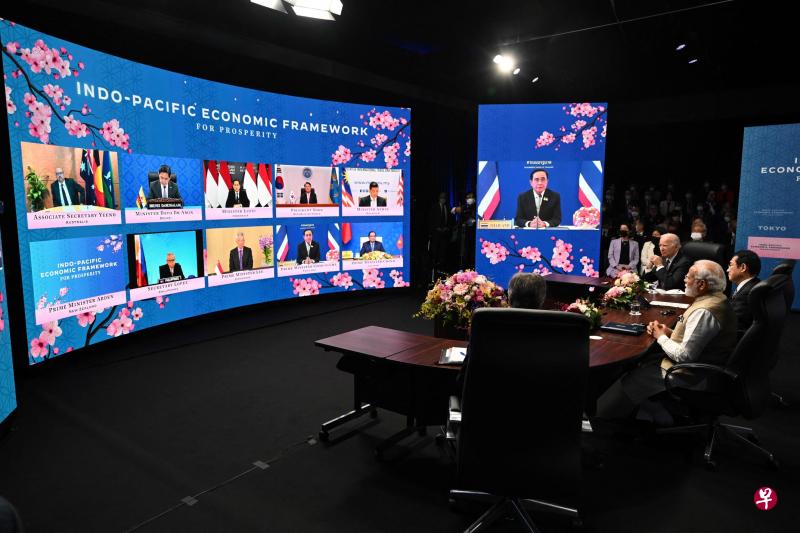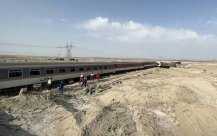
The Indo -Pacific Economic Framework plans to pass four pillar areas, namely "digital and traditional trade", "enhancement of supply chain toughness", "clean energy, de -carbonization and infrastructure", "taxation and taxation and and" tax and infrastructure "Anti -corruption measures to strengthen the cooperation of member states, which will not involve tariffs and market access negotiations.
(Tokyo Composite Electric) U.S. President Bynden launched the Indo -Pacific Economic Framework (IPEF) in Tokyo yesterday, which is the most important measure for the United States to participate in Asian economic affairs in five years.
IPEF founded 13 state -owned, in addition to the United States, there are also seven Southeast Asian countries in Japan, South Korea, India, India, Australia, New Zealand, and Indonesia, Singapore, Thailand, Vietnam, Brunei, Malaysia and the Philippines.The total GDP of 13 countries accounts for about 40 % of the world's.
The founding country of IPEF said in a joint statement: "This framework aims to enhance the toughness, sustainability, tolerance, economic growth, fairness and competitiveness of our economy.Cooperation, stability, prosperity, development and peace. "
Bayeng said at a press conference yesterday (May 23): "The future of the 21st century economy is mainly created in the Indo -Pacific region." "We are developing new rules to help the economy of all countries faster and faster, faster and faster and faster and faster and faster.Grow more fairly. "" I want to make it clear that this framework will be open to other countries they want to join in the future -if they agree with the goals of the framework and work hard to achieve these goals. "
Lee Xianlong: IPEF has strategic and economic significance
Japanese Prime Minister Kishita Tian Wenxiong said, "The important thing is to carry out positive cooperation discussions through the IPEF platform. These measures are expected to bring specific results and practical interests."
New Prime Minister Li Xianlong pointed out at the launching meeting of the Indo -Pacific Economic Framework through the video that IPEF is strategic and economic."It can become a valuable platform for economic diplomacy in the United States in the Indo -Pacific region, which clearly shows that the United States will continue to contact and deepen the United States in the Pacific region in the Pacific region."
It is reported that many countries in the Indo -Pacific region are reluctant to sign any agreement that does not include China. China is the largest trading partner country in most countries in the region.The United States took care of the requirements of most other founding countries, and agreed that the new multilateral economic framework was open to China.
A senior government official in the United States said that the United States did not invite mainland China to join, partly because of many standards that Washington wanted, and Beijing could not accept it.As for the Taiwan who wants to join, the White House national security adviser Sha Liewen said that Taiwan will not become a member of the IPEF, but Washington is seeking to deepen its economic and trade connection with Taiwan.
US Secretary of Commerce Raymond Doro said that the new framework provides alternatives outside the Chinese plan for Asian countries.She said that the current corporate community is actively looking for alternative options outside China, and American companies believe it will benefit from it.
Analysis: excluding tariffs to reduce the economic benefits of the new framework, the difficulty of quantifying the new framework
The Indo -Pacific Economic Framework plans to use four pillar areas, namely "digital and traditional trade", "enhancement of supply chain toughness", "clean energy, carbonization and infrastructure" and "tax and anti -corruption measures" to strengthen the member states'cooperate.
Some analysts pointed out that the new framework of the United States regards the "turning point of restoring economic leadership" and strives to strengthen influence.However, some commentators say that because of the domestic political resistance, the new framework does not include any tariffs, and it is unclear at present, so it is difficult to quantify its economic benefits.There are also some analysts that the new framework does not include reducing tariffs, and it is difficult to increase exports to the US market, which is not much beneficial for member states.
The negotiations have not yet been carried out, so it is unclear whether the new framework is required for the approval of the U.S. Congress.




